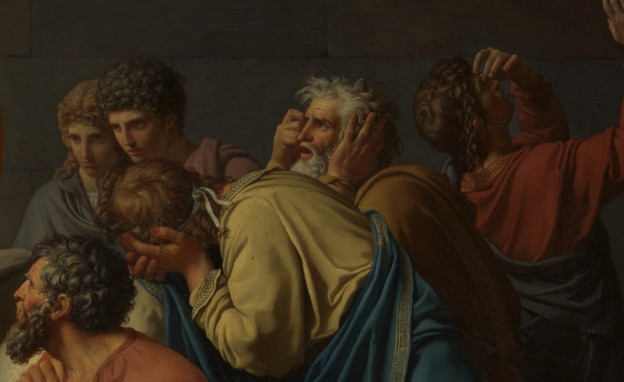All is not well in the world and its relationship to God. But that does not mean that all is right with the way the Church as a whole operates in its relationship to God either. If we are to truly worship God, then we should take care to worship him as he has revealed, not as we would like, or we may invite God’s displeasure.
In 1 Samuel 6 we see examples of the unbelieving world and God’s covenant people both offending God. The Philistines, suffering God’s judgement, sent the Ark back to Israel with their own ideas of what sacrifices might avert God’s wrath. Meanwhile the Israelites failed to treat the Ark as God had instructed them, and suffered the consequences. This reminds us to guide our lives and worship by God’s revelation, not our own thoughts, and to rely on Christ to stand in God’s holy presence.
Terror had swept the Philistine cities, as wherever the Ark of the Covenant went, sickness and death followed amongst the unbelievers there. After seven months, the people and their leaders had had enough (v.1). They asked their own diviners how to get rid of it, and hopefully the divine enemy they had made along the way (v.2).
Much like treating an offended spouse, the religious leaders of the Philistines suggested sending the Ark back with an offering to say sorry (v.3). While there was a great deal right with this statement, the suggested offering was not what God desired.
While God would have delighted in repentance, instead the religious leaders suggested making images of tumours and mice from gold and sending those back with the Ark (vv.4-5). It seems that while they had learnt from the lesson of Egypt in the Exodus (v.6), and recognised that a costly sacrifice had to be made, they did not recognise what was truly required. Mice were ritually unclean (Lev. 11:29), and tumours likewise.
To make sure it was definitely Israel’s God who had afflicted them, they suggested putting the Ark and offerings on a cart pulled by milk cows, who had never been yoked to a cart, with new calves to send it back (vv.7-9). The logic made sense – it is completely unnatural for such an animal to leave its newborn and pull a cart anywhere, unless by divine intervention.
Sure enough, the Philistine leadership did as advised, and the milk cows took the Ark straight to Israelite lands, to the town of Beth-Shemesh (vv.10-12). The Philistine leadership saw the Ark had gone back to Israel, heaved a sigh of hopeful relief, and went home (v.16). God, in his providence, chose to end things there (for then) with the Philistines.
Unfortunately, the Israelites also failed to follow God’s commands. The townsfolk of Beth-Shemesh were busy harvesting when the cattle appeared, and rejoiced when they saw the Ark returned to them (v.13). They quickly established an altar and offered sacrifices to God; it turns out in God’s providence that he Beth-Shemesh was a town assigned to the levites responsible for caring for the Ark (Num. 4, Josh. 21).
Except that for sacrifices, they offered the milk cows which carried the Ark back (v.14). Wrong move; only unblemished bulls were to be sacrificed as such (Lev. 1). Even worse, it seems that they turned the Ark, the golden mice, and the golden tumours (vv.15-18) into their own Hobbiton, despite God’s clear commands (Num. 4:20).
God was not amused, and struck down seventy townsfolk (v.19). Their response was not repentance, but like the Philistines: “Who is able to stand before the Lord, this holy God? And to whom shall he go up away from us?” (v.20). Get God away from us, they said!
Ironically, the Levites asked the folks of Kiriath-Jearim to take the Ark, which they duly did and set apart a man to take care of it (v.21-7:1). Kiriath-Jearim was a Gibeonite town, a town of Canaanites who had avoided destruction by deception during Joshua’s day but were subject to servitude (Josh. 9). Those non-Israelites were more faithful to God than their Israelite overseers, keeping it safe but not setting themselves up as a new priesthood (v.2).
The Gibeonite response is the response God seeks of his people. Not just joy and sacrifice, but the reverence and respect for God’s commands which comes by faith. After all, when confronted with the punishment for their offence against God’s holiness, Beth-Shemesh were just as quick as the pagans to reject God’s presence in apostasy and unbelief.
God’s holiness requires proper sacrifice and service, not like that offered by the Philistines or Beth-Shemeshites. In their day, the sacrifices established in the Law; which pointed forward to Jesus, the true sacrifice and sacrifice-maker for the sins of God’s People.
Jesus’ sacrifice turns away God’s wrath from us for offending his holiness, clothes us with righteousness, and enables us to offer our lives as living sacrifices, holy and acceptable to God. That is how we can stand before a holy God.


